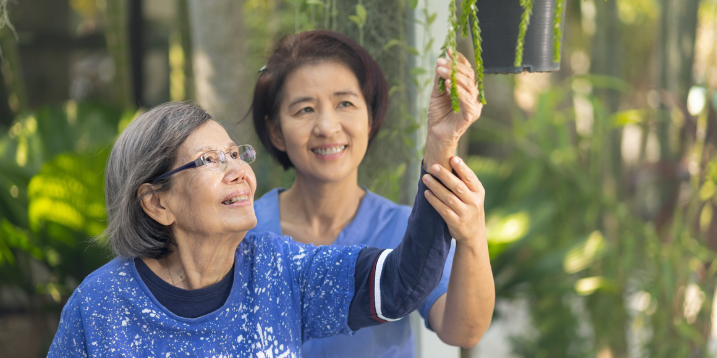
National Advance Care Planning Week, 20 - 26 March, is the perfect time to start the conversation and share what matters most to us in terms of our future health care preferences. Ming’s story shows how powerful advance care planning can be in terms of shaping our experiences during critical illnesses and end-of-life. And it all starts with some challenging but vital conversations with those closest to us.
Ming was in her mid-70s when she was diagnosed with lung cancer and told her illness was terminal. The care that she wanted in her final weeks of life reflected her way of life and was even influenced by her experiences as a child.
Ming grew up in a small village in Cambodia and shared her straw mat bed with her sister. They enjoyed fishing and hopscotch in between school and chores. They created lots of good memories.
As a young woman, Ming married a neighbour, Sann, and moved from sharing her mat with her sister, to sharing Sann’s mat. They had many happy years together and moved to Australia with their three young children.
Ming still preferred to sleep on their mat on the floor as it was more ‘like home’ and she felt connected to the earth. Whenever Sann was away for work, Ming would ask her children to sleep on her mat. Or she would sleep with them on their beds as she felt safest then. Her children eventually grew up, married, and had children of their own. The eldest daughter Nakry and her family lived in the house with Ming and Sann.
When Sann became very sick and had to go to hospital, he and Ming met a compassionate nurse who listened respectfully to Sann’s concerns for his family as he knew he was not going to recover. The nurse asked Ming what would be important to her after her husband died and Ming said, ‘Never being alone.’ She told the nurse that her eldest daughter or her grandchildren would sleep beside her on her mat on the floor to keep her calm and feeling safe, grounded, and loved. This continued beyond Sann’s death.
Ming became less interested in life and food after Sann’s death and she grew more frail. She was taken to hospital when a ‘nasty’ cough progressed, and she started showing some confusion. The doctor explained that Ming had lung cancer which had spread to her brain. He shared the news that Ming was likely in her final weeks of life, which devastated the family.
Within days, Ming became unsettled in hospital and the staff thought she might be in pain - but Ming could not explain what she needed in a way the staff could understand. The doctor offered some pain relief which the family refused. Her family said she didn’t like hospitals and it wasn’t culturally acceptable to have pain relief.
The compassionate nurse, who had previously visited Ming and her husband, noticed Ming’s name on the board of the palliative care unit and came to see the family. Ming’s children shared their concern at seeing their Mum so distressed and the nurse remembered Ming had said that what was most important to her was ‘never being alone.’
This reminded Nakry that her Mum had talked about her wishes and completed an advance care directive. Ming had said that she wanted to be connected to the earth ‘just like home.’ Together Nakry and the nurse realised what this meant. They advocated for the hospital to have Ming’s mat brought from home and to have the family sleep on the mat with Ming. They also noticed Ming had written, ‘I am okay to get pain relief if I can still open my eyes and see my family’. Ming died two days later with adequate pain relief to keep her comfortable. She was held by Nakry and her granddaughter who lay on either side of her. In this way, Ming was ‘never alone’ and able to feel comforted that it was ‘just like home.’
The time is now to talk about what matters most to you
National Advance Care Planning Week, 20 – 26 March, is the perfect time to talk to those closest to us about what is most important to us in our future health care. We may wish to document our values and preferences, including unique details like those Ming shared. It may be the music that we love or the pet that we want by our side if we become critically ill and no longer able to communicate our preferences. Our advance care directives should also detail our treatment preferences. They can become powerful statements about who we are, how we want to live (and die) and what we value most about living.
Ask your GP to sign your advance care directive. Check if they can upload your advance care planning documents to My Health Record or you can upload them yourself. Share copies with your chosen substitute decision-maker, family, friends, carers, local hospital, and other health providers. This will ensure documents, and therefore your preferences, can be accessed when they are needed most.
Visit acpweek.org.au to access a free email starter pack and other information. You can also find face-to-face awareness-raising events and online webinars available Australia-wide during National Advance Care Planning Week.
For free advice or to request a printed starter pack, call the National Advance Care Planning Support Service on 1300 208 582 from 9am - 5pm (AEST/AEDT) Monday to Friday.
Advance Care Planning Australia is funded by the Australian Government.